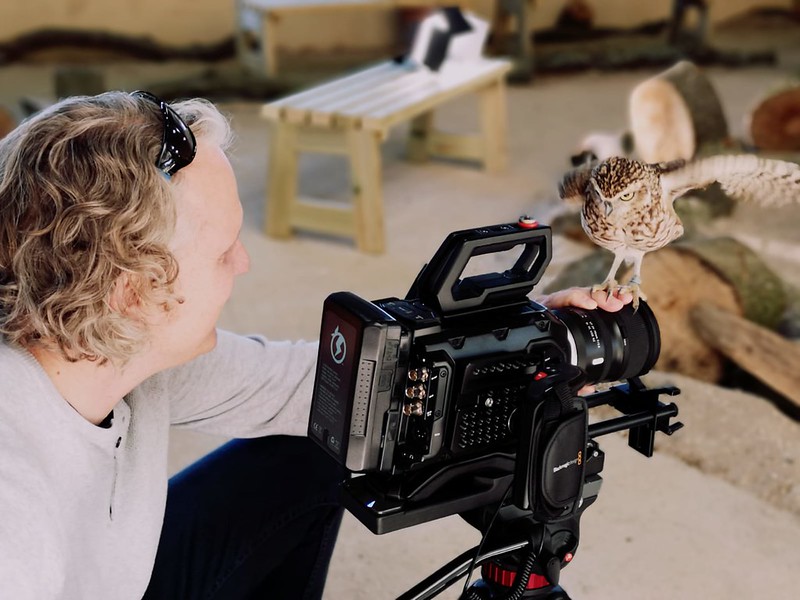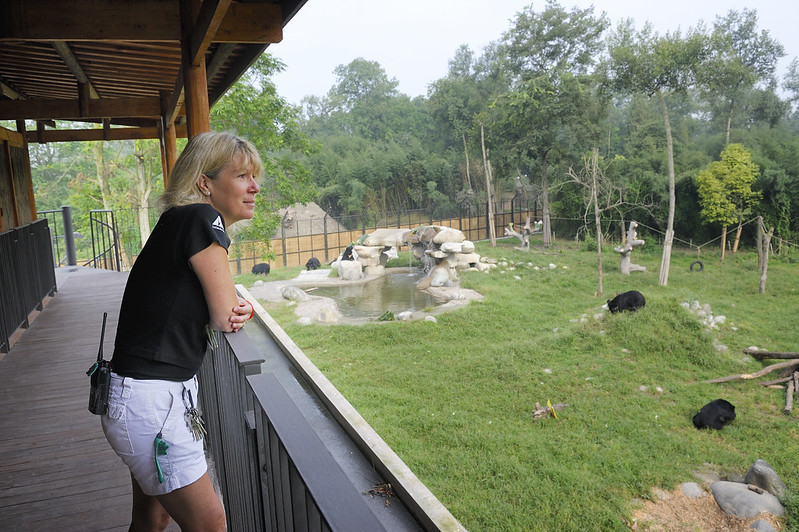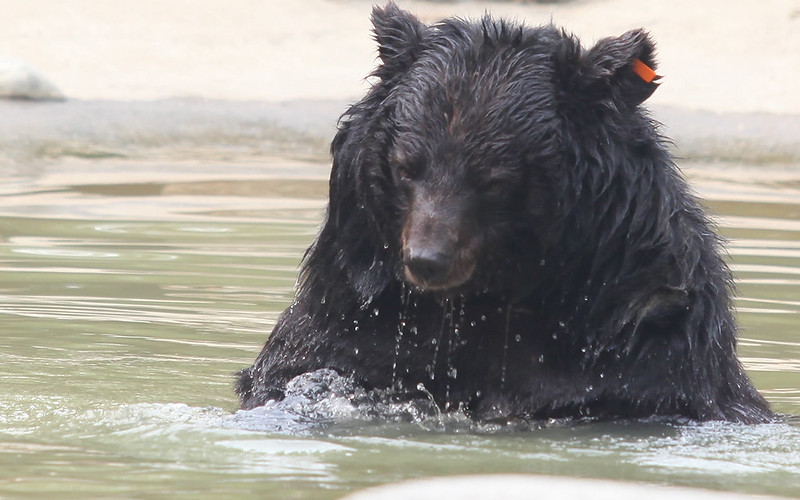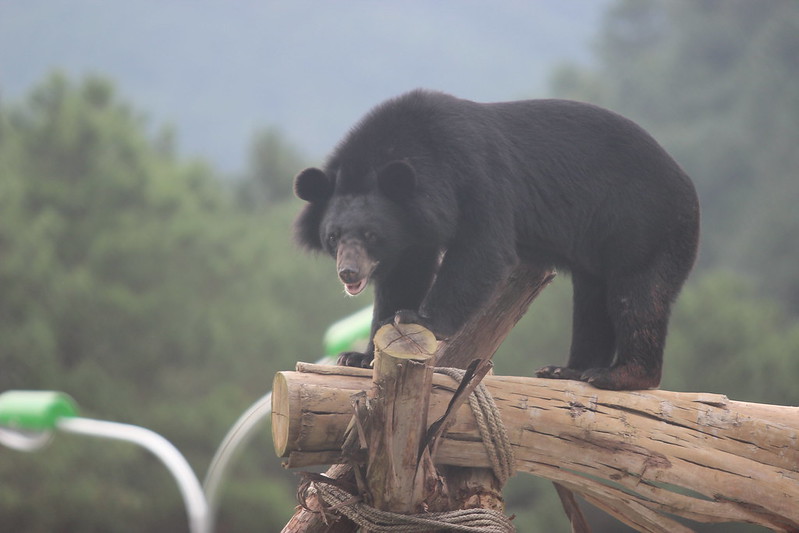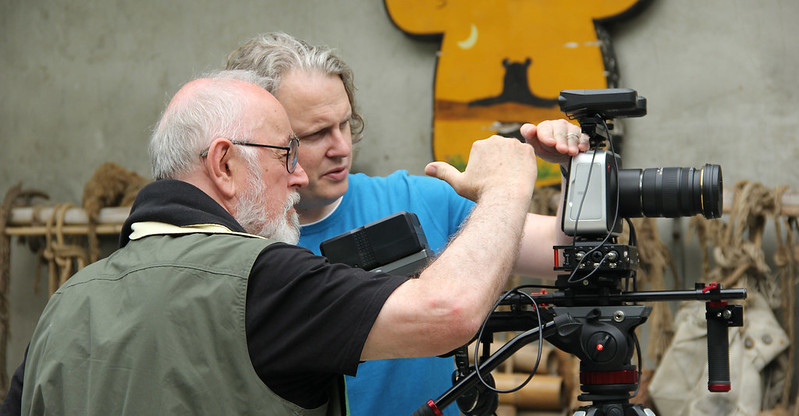#20thAnniversary: Exclusive interview with the director of Animals Asia documentary, “To the Moon and Back”
07 November 2018
Filmmaker Andrew Telling talks about the inspiration behind his insightful documentary “To the Moon and Back”, which tells the story of one woman’s calling to end bear bile farming.
In 2017, Orange Planet Pictures, a small studio with big ideas, released “Jill Robinson: To the Moon and Back”.
The documentary received rave reviews from celebrities and animal welfare advocates such as Ricky Gervais and told the story of Jill Robinson’s ground-breaking work to reveal – and end – bear bile farming in Vietnam and China.
Jill has opposed the brutal practice since 1993 and the organisation she founded, Animals Asia, has rescued and provided sanctuary for over 600 bears.
Narrated by actor, Peter Egan, the film also features interviews with “Downton Abbey” actress Lesley Nicol, Born Free founder, Virginia McKenna and Guns ‘n’ Roses drummer Matt Sorum.
Writer, director and comedian Ricky Gervais called it:
“A wonderful, heart-warming film about a truly inspirational woman”
While TV naturalist Chris Packham described it as:
“Uplifting and empowering – Jill Robinson proves that one person can change the world and make it a better place.”
To commemorate Animals Asia’s 20th Anniversary, we spoke to director Andrew Telling about how and why he made this most remarkable documentary.
Q: What inspired you to make “To the Moon and Back?”
“You may remember that during the summer of 2015, a then-unknown American dentist called Walter Palmer took a trip to Africa where he hunted and killed a lion called Cecil. The global condemnation was vast and vitriolic. But we noticed from various social media outlets that among the anger and sadness, there was also a feeling of hopelessness. In fact, we all felt disempowered and thoroughly inert in the face of something that appeared to be ‘quite legal’. How could that be?
“In the most graphic way, we realised that just because it’s within the law doesn’t make it right. The mass feeling of inertia was the most worrying aspect, as millions of animal loving people across the world questioned how they could make a difference when something so abhorrent was sanctioned. What can one person do against the unchecked march of hunters when a government says it’s OK?
“If ever there’s a person to inspire at times like this, it is Jill Robinson. In China, bear bile farming is still legal. When Jill started her drive to end it, it was significantly more prolific and less known that it is now. When she began, Jill was much like the millions of angry and emotional people who saw countless images of that bespectacled dentist draped over Cecil the lion. With nothing more than her resolve, Jill peacefully and intelligently rose to begin a movement that has changed local perceptions towards animal welfare in China and Vietnam. Jill was not wealthy or privileged and the path was predictably difficult. But, she did it. She saw animal suffering that was perfectly legal in a politically charged and socially complicated country. She overcame the fury, emotion and inertia and made a change.”
Q: What do you recall about your first meeting with Jill Robinson? What was that like?
“I remember it well. I was filming an event in London where Jill was presenting an Animals Asia update to supporters. I was introduced to her and, in all honesty, it was terrible timing because she was inundated with people keen to meet her while trying to prepare her presentation. And you know what? None of that affected the way she greeted me. Jill was kind, sincere and gracious and at no point was I made to feel anything other than valued and welcome.”
Q: You had the pleasure of meeting many rescued bears during filming, do any stand out for you?
“Three bears stand out. In the film, we follow Douglas through a health check and to be so close to a moon bear – to hold his hand, to stroke his fur, to lift his paws – was remarkable. But, like almost all of the bears, Douglas is compromised after the years spent in a cage. And to see and feel that up close brings home the reality of the industry. But, there's something joyfully humbling when seeing Douglas a day later romping around the sanctuary with other free and happy bears.
“Then there's Peter Egan's bear, Peter Bear. I've followed his journey from the very start and to see him with Peter (the man!) is just so great. The change in Peter Bear from day one to now showcases the scale and success of the work done by Animals Asia. He was depressed, broken and afraid when he arrived at Chengdu. Now he's joyously inquisitive, happy and playful!
“And finally, Jasper. I'd filmed with Jasper a few times and he died a week before we arrived to make the film. Even in his absence, he embodied the depth of love Jill and her team have for these bears. I can't talk about this industry without referencing Jasper. Even as I type, there's a picture of him behind me in the studio.”
Q: What were the best and most challenging parts of making the film?
“Sitting outside Jill's room as the sun set over the sanctuary with Jill, Peter, Nat (our producer), Nick (Bear Team Manager), Eddie (vet) and Wendy (nurse) with a cold beer in hand after a long day filming was just superb. The Chengdu sanctuary is such a fabulous place…full of life, hope, optimism and redemption.
“Challenging parts? Making sure we did Jill, her team and the bears justice. Jill entrusted us with this story, and to have disappointed her or let her down in any way would have been devastating. Oh, and when I broke my toes – that sucked! There was a moment when I was in the back of a truck with Jill and moon bear Douglas on the way to his health check. When arriving at the hospital, I had to jump from the truck to film them getting out and in the process, completely misjudged the distance. I landed with a crack and by evening, my foot had swollen up. It wasn't until I had an x-ray when I got home that I found out my toes were fractured. Still, I got the shot and aside from a bit of a hobble, the show went on!”
Q: Why should the world care about ending bear bile farming?
“Bear bile farming is the thick end of the cruelty wedge and represents a heinous part of humanity. There is no need for it, no benefit to it and, left unchecked, not only tortures bears but allows a dark spectre that has followed humans through generations to grow stronger and lead us to a desperate and selfish place. We cannot allow that. And because of Jill, her team and supporters globally, this vile industry could be ended in our lifetime. Consider the message that sends? Like-minded and compassionate humans will not sit idly by and allow the few to decimate animals and the natural world for selfish gains.”
Q: Is there anything the public can do to help?
“Give as much support as you can. And, as inelegant and gauche as this might sound, Animals Asia needs money. It costs millions to maintain this remarkable charity and I've seen for myself that every penny, dollar, cent or yen is fastidiously accounted for. There is no endeavour too small so whether you run an event that raises £10 or £1,000, it makes a difference, I promise. And tell people about it too because, unbelievably, the majority of people still don’t know this industry exists. Honestly, people can't believe that such a thing can exist in 2018.”
To the Moon and Back is available now from all good retailers including the Animals Asia shop, with 30% of all proceeds funding Animals Asia’s ongoing work.
BACK
